Portal:Bulgaria/Selected picture
Usage
[edit]The layout design for these subpages is at Portal:Bulgaria/Selected picture/Layout.
- Add a new selected picture to the next available subpage.
- Update "max=" to new total for its {{Random portal component}} on the main page.
Selected pictures list
[edit]Portal:Bulgaria/Selected picture/1

The Seven Rila Lakes are located in Rila, southwestern Bulgaria. They are the most visited group of lakes in Bulgaria, and are situated at elevation between 2,100 and 2,500 metres above sea level.
Portal:Bulgaria/Selected picture/2
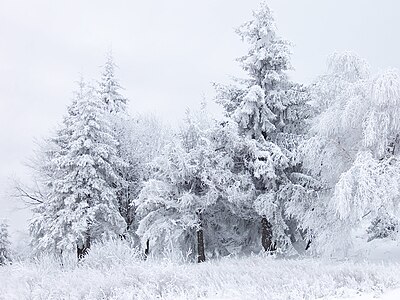
Shipka Pass is a scenic mountain pass through Stara Planina in Bulgaria. The maximum altitude of the pass is 1,150 m (3,820 ft). During the Russo-Turkish War, 1877-1878, Shipka Pass was the scene of a series of conflicts collectively named the Battle of Shipka Pass.
Portal:Bulgaria/Selected picture/3

Khan Omurtag, ruler of the First Bulgarian Empire from 814 to 831 AD. His rule saw a territorial expansion and active construction of large temples and palaces.
Portal:Bulgaria/Selected picture/4
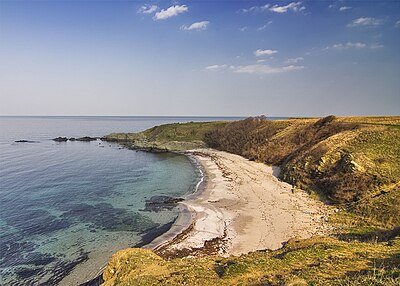
Varvara Beach is a secluded sandy beach near the village of Varvara. The village is located on the Black Sea coast of Burgas Province, between the towns of Tsarevo and Ahtopol, near the border with Turkey.
Portal:Bulgaria/Selected picture/5
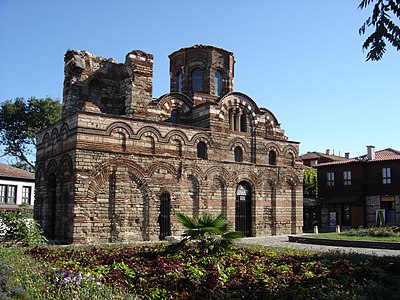
The Church of Christ Pantocrator is located on the peninsula of Nesebar, Bulgaria. The church, along with the entire island and all of the historical structures are protected by UNESCO.
Portal:Bulgaria/Selected picture/6
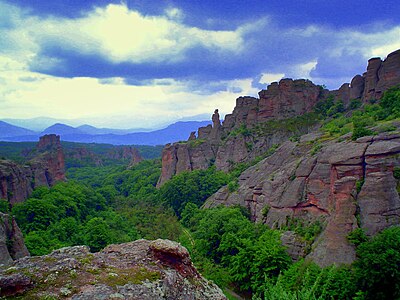
The Belogradchik Rocks (Bulgarian: Белоградчишки скали, Belogradchishki skali) is a group of bizarre sandstone and limestone rock formations, reaching up to 200 m in height. The rocks were declared a natural landmark in 1949.
Portal:Bulgaria/Selected picture/7

The village of Gyovren in the municipality of Devin, Bulgaria. The population of Gyovren is mainly ethnic Turks, as well as a few Romani families. Devin is a popular tourist attraction, with many hot springs and spa resorts.
Portal:Bulgaria/Selected picture/8

Sozopol (Bulgarian: Созопол) is a small ancient town located 30 km south of Burgas on the southern Bulgarian Black Sea Coast. Today the town is mostly a seaside resort known for the Apollonia art and film festival.
Portal:Bulgaria/Selected picture/9
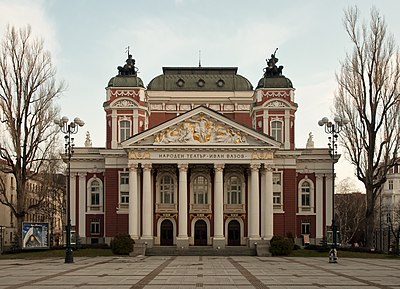
The Ivan Vazov National Theatre (Bulgarian: Народен театър „Иван Вазов“) is Bulgaria's national theatre, as well as the oldest and most authoritative theatre in the country and one of the important landmarks of Sofia, the capital of Bulgaria. It is named after the Bulgarian writer and poet Ivan Vazov.
Portal:Bulgaria/Selected picture/10

The Twin lake (Bulgarian: Близнака) is the largest of the Seven Rila Lakes, which are group of lakes of glacial origin (glacial lakes), situated in the northwestern Rila Mountains in Bulgaria. The lakes are situated between 2,100 and 2,500 metres elevation above sea level. The Twin lake is the largest with 9.1 ha.
Portal:Bulgaria/Selected picture/11

Shkorpilovtsi is a resort town on the Bulgarian Black Sea Coast. Black Sea Coast beaches occupy approximately 130 km of the 378 km coast. The region is an important centre for tourism during the summer, drawing foreign and Bulgarian tourists alike.
Portal:Bulgaria/Selected picture/12

The St. Clement of Ohrid University of Sofia or Sofia University (Bulgarian: Софийски университет „Св. Климент Охридски“) is the oldest higher education institution in Bulgaria, founded on 1 October 1888. The university's edifice was constructed between 1924 and 1934 with the financial support of the brothers Evlogi Georgiev and Hristo Georgiev, whose sculptures are now featured on its façade.
Portal:Bulgaria/Selected picture/13

A view of the northern part of the Pirin mountain. The second-highest mountain of Bulgaria, Pirin is famed for its 176 glacier lakes and harbours the UNESCO World Heritage Pirin National Park.
Portal:Bulgaria/Selected picture/14

The Smolyan lakes are situated in the western part of the Rhodope Mountains near the homonimous city.
Portal:Bulgaria/Selected picture/15

The Devil's Bridge (Bulgarian: Дяволски мост) spans over the Arda River in the eastern Rhodope Mountains.
Portal:Bulgaria/Selected picture/16
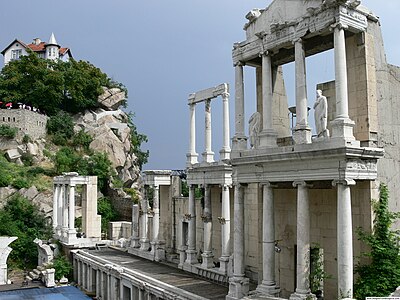
A view of the Roman theatre situated in the old quarter of Plovdiv, Bulgaria's second largest city.
Portal:Bulgaria/Selected picture/17

With a population of 385 Melnik (Bulgarian: Мелник), situated near the Melnik Rock Pyramids, is the smallest town in Bulgaria.
Portal:Bulgaria/Selected picture/18
Portal:Bulgaria/Selected picture/19
Portal:Bulgaria/Selected picture/20
Nominations
[edit]Pictures related to Bulgaria may be nominated here.
